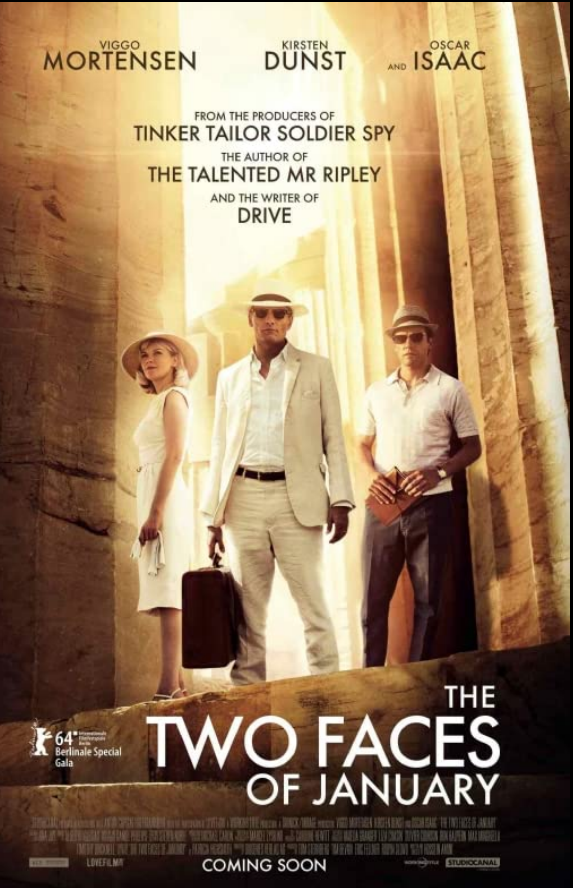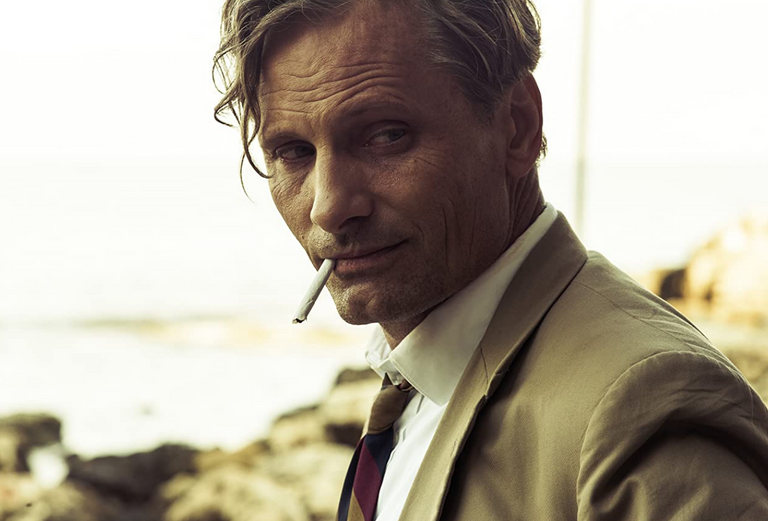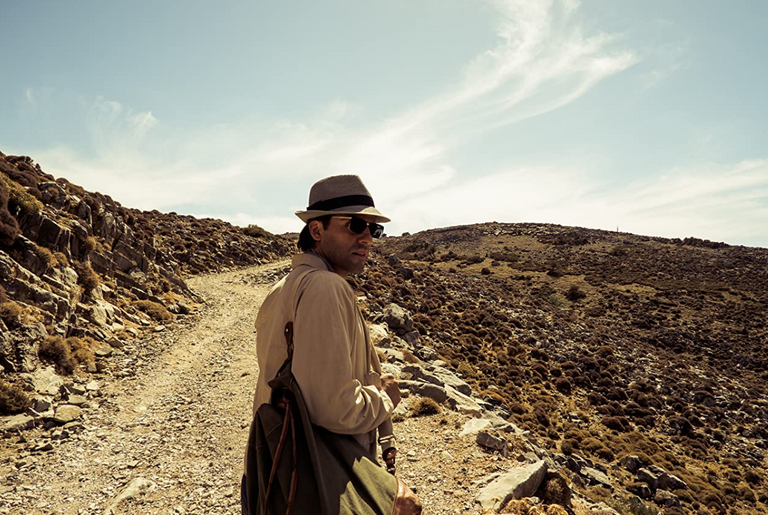
The Two Faces of January is a good film and the most remarkable thing about it, apart from the good performances of the main actors, especially Viggo Mortenssen, is that it represents the directorial debut of the Iranian Hossein Amini.
Everything about this film, which is the film adaptation of Patricia Highsmith's novel of the same name, has been particular and curious: it was shot in Greece, Turkey and a London studio and premiered at the Berlin International Film Festival.
Often an excellent novel does not find the right film adaptation or the right actors to represent it in the best possible way. Other times, as in the case of The Two Cras of January, it is exactly the opposite.

Las Dos Caras de Enero es una buena película y lo más notable aparte de a correcta interpretación de los actores principales, en especial Viggo Mortenssen, es que representa el debut como director de cine del iraniano Hossein Amini.
Toda en este película, que es la adaptación cinematográfica de la novela homónima de Patricia Highsmith, ha sido particular y curioso: se rodó en Grecia, Turquía y un estudio de Londres y se estrenó en el Festival Internacional de Cine de Berlín.
Muchas veces una excelente novela no encuentra la adaptación cinematográfica correcta o los actores que la representen de la mejor manera. Otras veces, como en el caso de Las Dos Caras de Enero es exactamente el contrario.

The plot is set in 1962 in Athens, Greece.
A wealthy American tourist copy represented by businessman Chester MacFarland (played by Viggo Mortenssen) and his charming wife Colette (played by Kirsten Dunst) accidentally meet while visiting Greek ruins Rydal Keener (played by Oscar Isaac), a young American who is working in Greece as a tour guide while waiting for the bureaucratic events related to his father's inheritance in the Hellenic country to be concluded.
What initially suggests a classic love triangle between a mature wife and husband and a nice young man goes much further in the film.
Rydal is in fact a con man, but Chester also has his mysterious and dark side, which is triggered when he is visited and threatened in his hotel by a private detective who, at gunpoint, orders him to return the money lost by some mafia investors who had put their trust in him and his investment projects.
A fight breaks out between the two and the detective dies when he falls and hits his head on the floor.
At that moment Rydal arrives to return Colette's bracelet, which he had forgotten in the taxi, and on learning of the turn of events, he decides to help them (also because of his attraction to Colette) to escape with his wife to Crete, trying to obtain new identities.
The death of the detective - albeit accidental -, the persecution they will surely suffer at the hands of the organised mafia and the need for self-protection among the three will develop a bond that will be complicated by the mutual attraction between Colette and Rydal.


La trama nos ubica en el año 1962 en Atenas, Grecia.
Una rica copia de turistas estadounidenses representada por el empresario Chester MacFarland Interpretado por Viggo Mortenssen) y su encantadora esposa Colette (interpretada por Kirsten Dunst) se encuentra accidentalmente cuando está visitando las ruinas griegas con Rydal Keener (interpretado por Oscar Isaac), un joven norteamericano que está trabajando en Grecia como guía turístico mientras espera que concluyan los eventos burocráticos relacionados con la herencia de su padre en el país helénico.
Lo que inicialmente hace suponer en el clásico triángulo amoroso entre esposa y esposos maduros y un joven simpático y desenfadado va mucho más allá en el film.
En realidad Rydal es un estafador pero Chester también tiene su lado misterioso y oscuro que se desencadena cuando es visitado y amenazado en su hotel por un detective privado quien, a punta de pistola, le ordena de devolver el dinero que han perdido algunos inversores de la mafia que habían confiado en él y en sus proyectos de inversión.
Se genera una lucha entre ambos y el detective muere al caer y golpear su cabeza el el piso.
En ese momento llega Rydal para devolver a Colette la pulsera que había olvidado en el taxi y al enterarse del giro que han tomado los acontecimientos decide ayudarlos (también por la atracción que siente por Colette) a escapar con su mujer a Creta tratando de obtener nuevas identidades
La muerte del detective -si bien accidental-, la persecución que seguramente sufrirán a cargo de la mafia organizada y la necesidad de autoprotegerse entre los tres se desarrollará un vínculo que se irá complicando por la mutua atracción entre Colette y Rydal.

Viggo Mortensen: Chester MacFarland
Kirsten Dunst: Colette MacFarland
Oscar Isaac: Rydal
Yigit Özsener: Yahya
Nikos Mavrakis: joven en el barco
Prometheus Aleifer: joven músico griego

Hossein Amini shows us the accidental nature of the crime and through a skilful mechanism of suspense with a very well cared and worked scenography, perfectly set in the sixties, in which repentance and guilt do not exist, he tries to reach the solution of the problem, at any cost, above any problem of moral origin.
At no point does it try to show the edges common in other films of crime, repentance, guilt and relative analysis.
Cold and stark, the film starts from a problem, intrinsic in the mentality of each of the protagonists, and tries to arrive at the final solution.
It doesn't matter if one is guilty of something (in other words, what little meaning can there be in swindling the mafia or the tourists who come to see the Greek ruins?) The important thing is to find a solution.
The brightness of the Greek scenery, picturesque and fascinating, is always present as in the best Greek tragedies.
Everything evokes a cinema of yesteryear, of refined quality, with special attention to detail, in which the conclusion does not disappoint, but does not surprise either.

Hossein Amini nos muestra el carácter accidental del crimen y a través de un hábil mecanismo de suspenso con una escenografía muy bien cuidada y trabajada, ambientada perfectamente en los años sesenta, en el cuál el arrepentimiento y la culpabilidad no existen, trata de llegar a la solución del problema, a toda costa, por encima de cualquier problema de origen moral.
No trata en ningún momento de mostrar las aristas comunes en otras películas de delito, arrepentimiento, culpabilidad y relativo análisis.
Fría y descarnada la película parte de un problema, intrínseco en la mentalidad de cada uno de los protagonistas, y trata de llegar a la solución final.
No importa si se es culpable de algo (en otras palabras que poco significado puede tener estafar a la mafia o a los turistas que acuden a ver las ruinas griegas?). Lo importante es encontrar una solución.
La luminosidad del escenario griego, pintoresco y fascinante está siempre presente como en las mejores tragedias griegas.
Todo evoca un cine de antaño, de calidad refinada, con especial atención a los detalles, en el cuál la conclusión no decepciona, pero tampoco sorprende.
See you in the next review.
**Nos leemos en la próxima reseña.
Crossposting / Posteo cruzado.

Sources consulted (my property) for the preparation of this article. Some paragraphs may be reproduced textually.
Fuentes consultadas (de mi propiedad) para la elaboración del presente artículo. Algunos párrafos pueden estar reproducidos textualmente.
| Argentina Discovery. |  |
|---|---|
| Galería Fotográfica de Argentina. |  |
| Viaggio in Argentina. |  |
| Patagonia Express. |  |

Upvoted. Thank You for sending some of your rewards to @null. Read my last posts to make sure that BLURT burning is profitable for you. Before using this bot please make sure your account has at least 100 BP. Get more BLURT:
@ mariuszkarowski/how-to-get-automatic-upvote-from-my-accounts@ blurtbooster/blurt-booster-introduction-rules-and-guidelines-1699999662965@ nalexadre/blurt-nexus-creating-an-affiliate-account-1700008765859@ kryptodenno - win BLURT POWER delegationThanks @ctime!